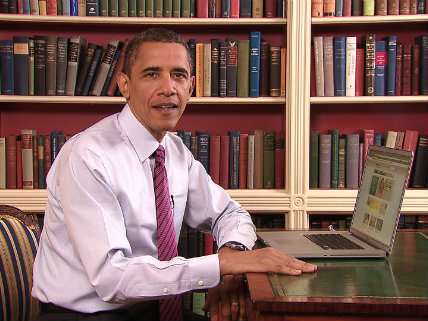The FCC's Big Internet Power Grab Comes Directly From the White House
Tom Wheeler's Title II net neutrality push is the result of an "unusual, secretive" push from the administration.

Why did Federal Communications Commission (FCC) Chairman Tom Wheeler decide to embrace the idea of regulating the Internet like a utility?
He says it's because he saw that the wireless industry had thrived under similar regulation. But as a report in today's Wall Street Journal makes abundantly clear, it was really a response to pressure from the White House, which effectively ran a shadow FCC.
Activists had pressured Wheeler throughout last year to pursue Title II reclassification of broadband service, which would make its regulatory treatment more like a utility, but Wheeler resisted.
Then in November, President Obama unexpectedly weighed in, siding firmly with the activists who wanted reclassification in a video calling for the FCC to adopt the "strongest possible rules" to protect net neutrality.
The FCC chief swiftly changed his views. As the Journal reports…
The president's words swept aside more than a decade of light-touch regulation of the Internet and months of work by Mr. Wheeler toward a compromise….
The prod from Mr. Obama came after an unusual, secretive effort inside the White House, led by two aides who built a case for the principle known as "net neutrality" through dozens of meetings with online activists, Web startups and traditional telecommunications companies.
Acting like a parallel version of the FCC itself, R. David Edelman and Tom Power listened as Etsy Inc., Kickstarter Inc., Yahoo Inc. 's Tumblr and other companies insisted that utility-like rules were needed to help small companies and entrepreneurs compete online, people involved in the process say.
As the folks at TechFreedom point out, Wheeler has now reversed himself on a number of issues related to net neutrality in order to align with the preferred position of the White House.
Technically, the FCC is an independent agency charged with making its own decisions on such matters. But the Journal's report, and Wheeler's multiple reversals, suggest that in practice, it is instead acting as a direct extension of the White House, proposing policy changes that the agency's chairman would not have supported without unusual and aggressive prodding from the administration.


Show Comments (138)